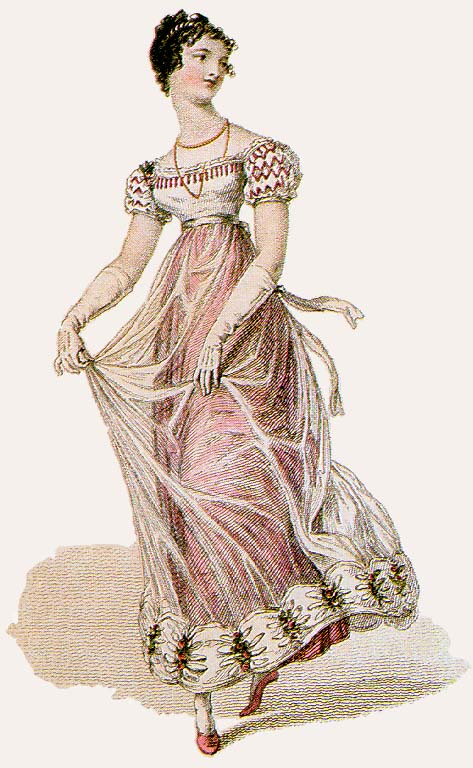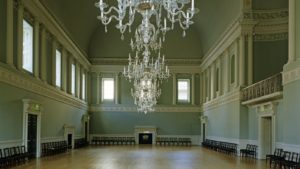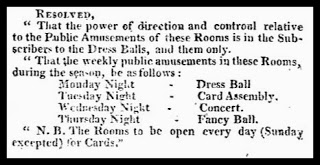Now, here we are at the assembly rooms. Keep up, keep together, we have a lot to learn and see. Luckily, I am to hand you over to an excellent guide, a Miss J. Austen, resident of Bath for some years now, a lady who is very fond of dancing.
Miss Austen, my sincere apologies, as you will see, this group are something of an ungainly rabble, but I am sure you can keep them in order. Just be sure they don’t touch anything – they’ve just been to Sally Lunns bakery and their hands are no doubt sticky.

“Thank you, Mr King, I shall do my best to educate them, not only on the purposes, delights and customs of the Upper Rooms, but also upon the dangers of disordering their stomachs with too many bath buns.
Mr King is the master of ceremonies here, and will leave us now, as he is busy; all men claim to be – though I have never yet met with one who can undertake more than two tasks at once. Mr King’s job is to preside over social functions, welcome newcomers, and enforce those regulations which have been designed to preserve decorum and promote social interaction.
Now, into the ballroom we go. I am told it is 105 feet long, and 42 feet wide, though even these impressive dimensions do not prevent one’s toes occasionally being trodden upon by a less than graceful partner. Fortunately, there are some impressive portraits hanging up, including one or two famous Gainsborough’s, and some grand gilt-framed looking-glasses at one end. So if you are faced with the prospect of an inelegant partner, you might find a better looking one on the walls. Direct your eyes heavenwards ladies and gentlemen, and you will see a magnificent panelled ceiling, and hanging from it, five spectacular chandeliers.

The door on the right leads to the Octagon room; anyone who feels the need to ask, upon entering it, why it is named so shall be asked to leave the tour immediately. Come along now, follow me, no talking at the back.
Now, this room boasts an elegant domed roof and frieze, features that generally go unnoticed, due its being a pathway to the tea-room and the card-room. The layout is supposed to encourage the free flow of guests, but more often than not, it only encourages a great squash of people who lack the decisiveness to know exactly where they should go next for entertainment. Bath is so popular that at the height of the season, it can boast as many as 8,000 visitors at once. I have known this place so crowded, that it has felt as if all of them had descended upon the Upper Rooms at once.
Of course, it you are to attend a ball here, you will need to know some more particulars. There are two balls weekly, the dress ball on a Monday and the Fancy ball on a Thursday. And you will wish to know what time to arrive. Balls begin at six and end at eleven. At about nine o’clock the gentlemen treat their partners with tea. At the end of the evening Mr King will enter the ballroom and order the music to cease – this is precisely at eleven o’clock, you understand, even if you are in the middle of a dance. You will be allowed to rest awhile though ladies, to cool your cheeks, before you are handed into your carriage or sedan chair.
Oh, you have a question. Go on then. No, the Fancy ball is nothing to do with fancy dress or masquerade. Instead it is an opportunity to forgo your very best finery, for a shorter skirt, better for dancing the cotillion. It is rather a fast dance and so you will wish to pin up your outer skirts.
Now, have you seen and heard all you wished to? Good, but before I go, I must raise the distasteful subject of money. Subscription to the balls costs half a guinea, and tea is an extra sixpence – though I find it of middling quality and would think it too expensive by far at tuppence. Gentlemen, you will pay extra for entrance to the card rooms, and please remember, my dear sirs, that boots are strictly forbidden in the Upper Rooms.
I should also mention that the Rooms are a popular place to promenade in the daytime, and you may have guests to breakfast here, should you chose.

Amusements at the Upper Rooms, from Guide to Watering Places
Good day to you all, I am bound for the circulating library, and after that I may take a stroll around Sydney Gardens, and for a while I may lose myself, but not my morals or good sense, in the labyrinth. I wish you the very best of luck, but take care of your hearts, Bath is known as something of a marriage mart – and well, to be fond of dancing – I sometimes think it a certain step towards falling in love.”
“every one mixes in the Rooms upon an equality…the constant rambling about of the younger part
of the company is very enlivening and cheerful. In the morning the rendezvous is at the Pump-Room;
– from that time ‘till noon in walking on the Parades, or in the different quarters of the town, visiting the shops, etc;
– thence to the Pump-Room again, and after a fresh strole, to dinner; and from dinner to the Theatre
(which is celebrated for an excellent company of comedians) or the Rooms, where dancing, or the card-table,
concludes the evening.” (Christopher Anstey, The New Bath Guide, or Useful Pocket Companion, 1799)
In the ball-room, the long card-room, the octagonal card-room, the staircases,
and the passages, the hum of many voices, and the sound of many feet,
were perfectly bewildering. Dresses rustled, feathers waved, lights shone,
and jewels sparkled. There was the music — not of the quadrille band,
for it had not yet commenced; but the music of soft tiny footsteps, with now
and then a clear merry laugh — low and gentle, but very pleasant to hear
in a female voice, whether in Bath or elsewhere –
(Charles Dickens, The Pickwick Papers)

5 comments
Skip to comment form
You always delight me Caitlin with your gentle wit and lightness of pen.
Author
Thank you, Nathalie
Glad you liked it
Light, bright, and sparkling, indeed!
I loved the tour given by Jane. How much fun it was.
Thanks, Deborah.